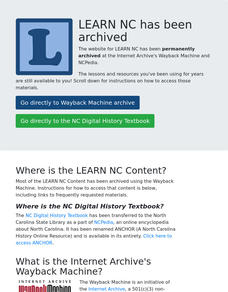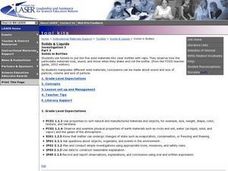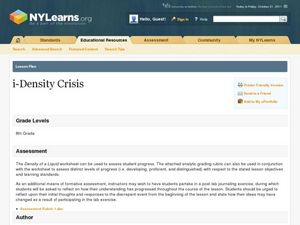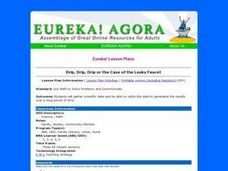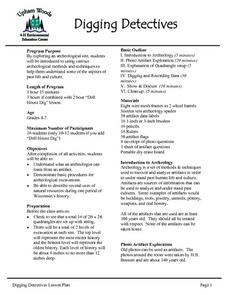Pennsylvania Department of Education
The Weight of Things
Students explore weight. In this math instructional activity, students predict which item weighs more and discuss how they arrived at their decision. Students weigh several items to determine which weighs more.
Curated OER
Brain POP- Properties of Matter
In this properties of matter worksheet, learners answer 18 questions about mass, density, volume or weight. All of the questions are multiple choice.
Curated OER
Bubbles
Third graders perform an experiment using different mixtures of dishwasher detergent. They construct bar graphs that record their bubble data for each detergent set.
Curated OER
Bubbles
Eighth graders experiment with a number of dishwashing liquids to determine the duration of the bubbles. They graph the data, add glycerin to the dishsoap, and repeat the experiment. They graph and compare the data sets.
Curated OER
Introducing Particles
Students predict what is going to happen using prior knowledge being prepared to alter a view when faced with new evidence. They then accurately measure and record liquid volumes realizing that liquids and granular solids have...
Curated OER
Metric Mania
Students observe how to measure in metric units. In this investigative lesson students compare different units of volume to see how things are measured.
Curated OER
Water Chemistry
Students engage in a lesson that is concerned with the concept of water chemistry. They conduct research using a variety of resources. Students also consider an experiment to observe how water has the abiility to exist as three different...
Curated OER
Chilly Discoveries
First graders make ice cream and determine what makes this liquid turn into a solid.
Curated OER
Crazy Putty Ratio
Second graders use knowledge of measurements and ratios to mix various combinations of liquid starch and glue. They chart their ratios, make observations, and write a summary of the activity. They mix their own batch of Crazy Putty to...
Curated OER
A Simple Viscosity Test
Fourth graders experiment with the viscosity of different liquids. They use a stopwatch to time the a steel ball as it drops through different liquids.
Curated OER
Solids in Bottles
Students use funnels to put the five solid materials into clear bottles with caps. They observe how the particulate materials look, sound, and move when they shake and roll the bottle. Finally, students write "sound and touch" poetry.
Curated OER
Space Exploration
Fourth graders observe an empty 14 oz. clear plastic cup and measure how much water the cup can hold when it is completely full. They work in groups to fill the plastic cup, but half of the groups receive a smaller vial and the other...
Curated OER
Vision Props of Signed Numbers
Students explore the concept of titration. In this titration lesson, students observe acid and alkaline reacting. Students discuss pH factor, measuring acidity, neutrality, and alkalinity of liquids. Students put the pH of liquids on a...
Curated OER
The Portion is the Poison
Middle schoolers calculate the amount of everyday food products or liquids that would need to be consumed in order to become toxic. By using unit analysis, they calculate the amount of certain common food items that would need to be...
Curated OER
i-Density Crisis
Eighth graders determine the density using mass and volume. In this science lesson, 8th graders explain why some materials float or sink. They estimate the density of objects based on whether it floats or sinks in a liquid of known density.
Curated OER
Keeping Warm
Fifth graders measure the temperature of water using a thermometer. They record the temperatures of water on a chart. Students use the temperature data to determine which materials are the best conductors of heat. They discuss their...
Curated OER
Drip, Drip, Drip
Students gather scientific data and be able to utilize the data to generalize results over a long period of time. They use the appropriate tools to measure quanities of liquids and analyze the data to determine the cost of a leaky faucet.
Curated OER
Making Sense of Density
Students identify the concepts of density, mass, and volume that define the property of a substance. They also determine that the properties of materials, such as, density and volume, can be compared and measured by using rulers,...
Curated OER
Digging Detectives
Students demonstrate basic procedures for archeological excavations. They explore an archeological site, students using various archeological methods and techniques to determine some of the aspects of past life and culture.
Curated OER
Discovering Pi
Fourth graders are introduced and experiment with the concept of pi. Using this information, they discover the relationship between the circumference and diameter of circles. In groups, they practice measuring the circumference of...
Curated OER
Is It Safe To Go In?
Students examine acceptable levels of toxins in swimming areas. Working in groups of four, students dilute a salt or sugar solution to 1 part per 1,000,000 (ppm) solution. Students taste test their diluted liquids and record at which...
Curated OER
Balloon Rocket
In this friction investigation worksheet, students follow the directions to construct a balloon rocket. Students use a string lubricated with soap and a drinking straw with a balloon. This is a page from the UK.
Curated OER
Water & Ice
Students investigate the properties of water. For this states of water lesson, students explore how water goes from liquid to solid and back to liquid again. Students use measurement, observation, and communication to describe the change.
Curated OER
Sun or Shade?
Third graders use a thermometer to measure the air temperature in several places around the school and then graph the data. They grow 3 plants in different sunlight and record the growth.









